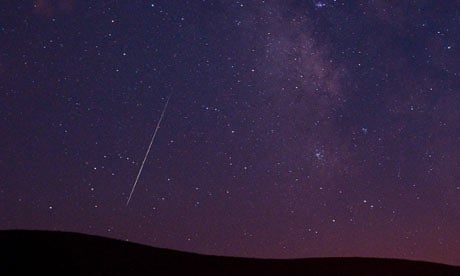If you've never seen a shooting star, tonight could be your best chance to do so for a while: the annual Perseid meteor shower is peaking at the moment, so if you can find clear skies away from city lights, you could be in for an inspiring, astronomical treat.
People often wonder how astronomers can predict something that is apparently so random, but the answer is quite simple: passing comets have left trails of dust and debris in the way of our path around the sun. Every time the earth runs into one of these clouds of dust, we get a meteor shower, as the tiny, rocky particles burn up upon entering our atmosphere at high speed.
Tonight's shower originates from interplanetary dust in the direction of the constellation Perseus, below the familiar W-shape of Cassiopeia in the north-eastern sky, hence the name Perseids. (The stars of Perseus have nothing to do with the meteors, being trillions of miles away.) The meteors will streak across all parts of the sky like silent fireworks, and the best time to view them will be after midnight: during British Summer Time, that means after 1am.
The waning moon drowns out the light from fainter meteors, but I managed to see a couple of Perseids last night whilst driving along unlit countryside roads in Cambridgeshire. The most memorable meteor shower I have seen was the Orionids, again whilst driving under the relatively dark skies of Hampshire, a decade ago. But in 2007, when the Perseids were most visible due to the moon being invisible, we saw nothing from east London and its suburbs in Essex, whilst relatives in Leicestershire had a glorious view.
Although the weather over the UK is quite cloudy at present, many parts of the country are forecast to have clear skies for at least part of the night, particularly in the Midlands or the north. (The Perseids are visible from around the world, but the best views are from the northern hemisphere.)
So, if you're away from the city lights under clear skies tonight, perhaps in the countryside or coastal areas, you may wish to watch out for this cosmic display, whether alone or with friends. One phenomenon you are likely to see regularly that is not to be confused with meteors is a bright point of light, moving steadily and in a straight line across the sky before fading away. These are our man-made satellites, used for telecommunications and military purposes, that brighten up as they reflect the light of the sun before disappearing into the earth's shadow as they repeat their orbits around us.
If you can thwart the conspiracy of cloud, city lighting and moonlight, and keep a steady eye on the dark skies, undistracted by interfering satellites, you are likely to be rewarded with a fantastic celestial display. And each time your eye picks out one of these dashing invaders from space, you are likely to feel the urge to make a wish, say a prayer or simply exclaim, "Wow!"
